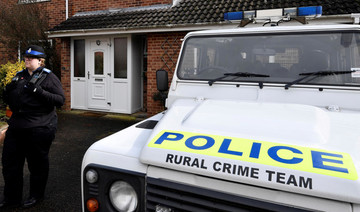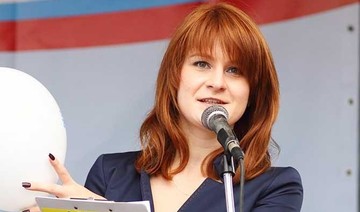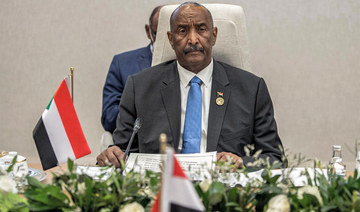ASPEN, Colorado: National Intelligence Director Dan Coats’ drumbeat of criticism against Russia is clashing loudly with President Donald Trump’s pro-Kremlin remarks, leaving the soft-spoken spy chief in an uncomfortable — and perhaps perilous — place in the administration.
Trump’s remarks after Wednesday’s Cabinet meeting, where he appeared to deny the longtime US foe was still targeting American elections, are just the latest in a growing list of statements that conflict with Coats’. His job is to share the work of the 17 intelligence agencies he oversees with the president.
Coats, who will be speaking Thursday at a national security conference in Aspen, Colorado, is a former Republican lawmaker. He was banned from traveling to Russia in 2014 for calling out its annexation of Crimea, and he has continued to raise the alarm on Russia since his appointment by Trump as intelligence chief in March 2017.
That’s left Coats in a tight spot. Trump has been determined to forge closer ties with Russian President Vladimir Putin, culminating in this week’s extraordinary summit in Helsinki. The disconnect with Coats was laid bare after Trump sparked outrage back home by giving credence to Russia’s denial of interference in the 2016 US election as he stood alongside Putin.
Back in Washington, Coats was quick to issue a statement Monday to rebut that position. He restated the US intelligence assessment about Russian meddling and “their ongoing, pervasive efforts to undermine our democracy.”
Former intelligence officials say Coats is just speaking truth to power, a mantra often used in describing the intelligence agencies’ historical relationship with any president. But in the Trump administration, Coats could be walking into a minefield, given the president’s track record of firing officials who don’t toe his line.
Michael Morell, former deputy and acting director of the CIA, said Coats and other national security officials in the Trump administration are just doing their jobs, and the president undermines them and the institutions they lead when he makes “inaccurate statements.”
“By doing this, the president is undermining our national security,” Morell said.
Trump did walk back his post-Putin summit comments on Tuesday, saying he’d misspoken when he said he saw no reason why it was Russia that had interfered in the 2016 election. He also said he accepted the intelligence agencies’ conclusion of Russian meddling. But he added, “It could be other people also. A lot of people out there.”
The president’s mixed messaging grew even more confusing Wednesday. He was asked if Russia was still targeting the US and answered “no” — a statement that Morell contended was “flat-out wrong” because the Russians never stopped trying to interfere in the US democracy.
White House press secretary Sarah Huckabee Sanders said later that Trump does believe that Russia may try to target US elections again and the “threat still exists.”
When asked Wednesday in a CBS News interview whether Trump agrees with Coats that the Russian threat is ongoing, the president said he did.
“Well, I accept. I mean, he’s an expert. This is what he does. He’s been doing a very good job. I have tremendous faith in Dan Coats, and if he says that, I would accept that. I will tell you though, it better not be. It better not be,” Trump said.
Trump has had a tense relationship with US intelligence agencies since before he was elected, largely because of their conclusion that Putin ordered “an influence campaign” in 2016 aimed at helping the Trump campaign and harming his Democratic opponent, Hillary Clinton.
Earlier in the administration, Coats’ voice was drowned out by the more outspoken Mike Pompeo, who was CIA director before Trump tapped him as secretary of state. Now with Pompeo heading the State Department, Coats has been thrust into the limelight as the voice of the intelligence community. In Aspen on Thursday, he’s expected to outline the cyberthreats the US faces from Russia as well as other countries, such as China, North Korea and Iran.
Coats, 75, has been immersed in Washington politics for years. He served in the House in the 1980s and the Senate in the 1990s and 2010s and was the US ambassador to Germany from 2001 to 2005. In 2014, Coats, who was a member of the Senate Intelligence Committee, denounced Russia’s interference in eastern Ukraine and was banned from Russia.
Coats blew it off: “Our summer vacation in Siberia is a no-go,” he joked.
Still, Coats is not known as being flippant. He’s prided himself as being a steady voice, but it’s clear he is no fan of Russia.
In comments at a Washington think tank last week, he said, “The Russian bear ... is out of the cave, hungry and clawing for more territory, more influence and using the same tactics we saw in the Cold War and more.”
He said the “more” is cyberthreats that are targeting US government and businesses in the energy, nuclear, water, aviation and critical-manufacturing sectors. He said that while there had not been the scale of electoral interference detected in 2016, “we fully realize that we are just one click on a keyboard away from a similar situation repeating itself.”
Those tough remarks came just days before the Trump-Putin summit — and that was not the first time Coats has made statements starkly at odds with his boss.
On June 8, when Trump suggested at a summit in Canada that Russia should be asked to rejoin the G-7 organization of industrialized nations, Coats was making a speech in Normandy, France. There, Coats offered a laundry list of what he said were recent malign activities by Moscow. Those included political hacking in France, Germany and Norway, a damaging cyberassault on Ukraine, and Russian agents’ alleged attempt to kill two people in Britain with a nerve agent.
“These Russian actions are purposeful and premeditated and they represent an all-out assault, by (Russian President) Vladimir Putin, on the rule of law, Western ideals and democratic norms,” he said.
US intelligence chief is tough on Russia, at odds with Trump
US intelligence chief is tough on Russia, at odds with Trump
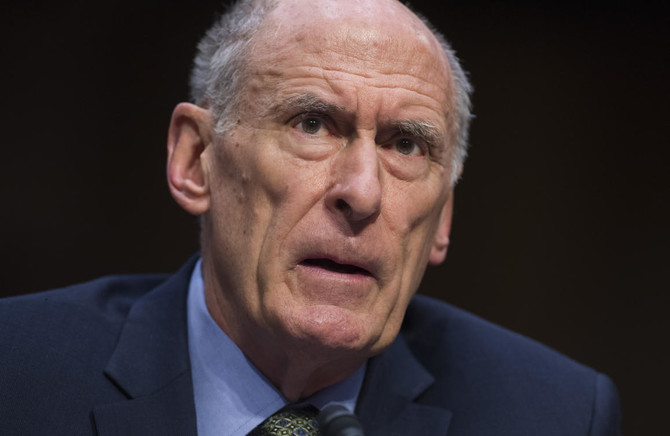
- Dan Coats’ drumbeat of criticism against Russia is clashing loudly with President Donald Trump’s pro-Kremlin remarks
- Trump has been determined to forge closer ties with Russian President Vladimir Putin
India protests separatist slogans allowed at Toronto event
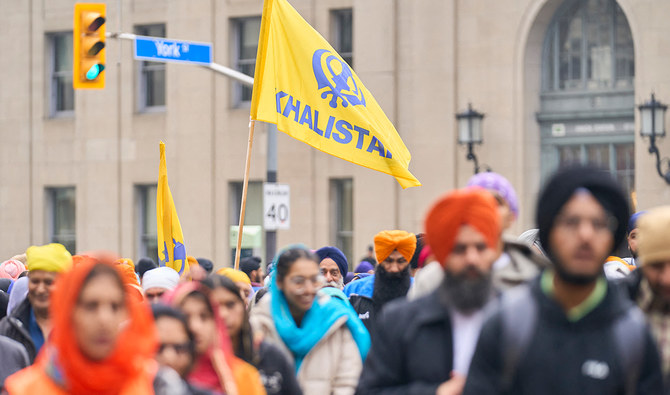
- Bilateral relations soured last year after Canada linked Indian agents to June 2023 murder of its national
- Hardeep Singh Nijjar, 45, was shot dead outside a Sikh temple in Surrey, which has a large Sikh population
NEW DELHI: India summoned the Canadian Deputy High Commissioner on Monday and expressed “deep concern and strong protest” after separatist slogans in support of a Sikh homeland were raised at an event addressed by Prime Minister Justin Trudeau.
Bilateral diplomatic relations soured last year after Trudeau said Canada was “actively pursuing credible allegations” that Indian agents were potentially linked to the June 2023 murder of a Canadian citizen.
Hardeep Singh Nijjar, 45, was shot dead outside a Sikh temple on June 18 in Surrey, a Vancouver suburb with a large Sikh population. Nijjar supported a Sikh homeland in the form of an independent Khalistani state and was designated by India as a “terrorist” in July 2020.
New Delhi has denied any formal government role in Nijjar’s murder.
India’s foreign affairs ministry said on Monday it had conveyed “deep concern and strong protest” at such actions “being allowed to continue unchecked at the event.”
Slogans supporting the rise of a separatist state were raised at an event in Toronto, according to ANI news agency, in which Reuters has a minority stake.
“We will always be there to protect your rights and your freedoms, and we will always defend your community against hatred and discrimination,” ANI reported Trudeau as saying.
Canada has the highest population of Sikhs outside their home state of Punjab in India, and the country has been the scene of many demonstrations that have irked India.
The Canadian foreign ministry did not immediately respond to a request for comment.
UN asks South Sudan to remove new taxes that led to a pause in food airdrops
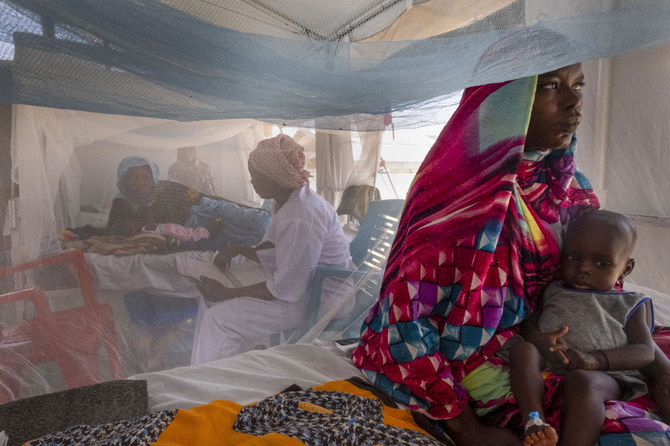
- UN said that pausing of airdrops in March had deprived of food 60,000 people who live in areas that are inaccessible by road
JUBA: The United Nations has urged South Sudan to remove newly imposed taxes and charges that led to the suspension of UN food airdrops for thousands of people who depend on outside aid.
The UN Humanitarian Affairs Agency said Monday in a statement that the pausing of airdrops in March had deprived of food 60,000 people who live in areas that are inaccessible by road, and their number is expected to rise to 135,000 by the end of May.
The UN said the new charges would have increased operational costs to $339,000 monthly, which it says is enough to feed over 16,300 people. The new charges introduced in February are related to electronic cargo tracking, security escort fees and new taxes on fuel.
“Our limited funds are spent on saving lives and not bureaucratic impediments,” Anita Kiki Gbeho, the UN humanitarian coordinator for South Sudan, said.
UN spokesman Stéphane Dujarric said in New York that the taxes and charges are also impacting the nearly 20,000-strong UN peacekeeping mission in South Sudan, “which is reviewing all of its activities, including patrols, the construction of police stations, schools and health care centers, as well as educational support.”
The UN says the South Sudan government had said it would remove the new charges and taxes but had not committed to it in writing since February.
An estimated 9 million people out of 12.5 million people in South Sudan need protection and humanitarian assistance, according to the UN The country has also seen an increase in the number of people fleeing the war in neighboring Sudan, further complicating humanitarian assistance to those affected by the internal conflict.
French police remove pro-Palestinian students from the courtyard of Sorbonne university in Paris
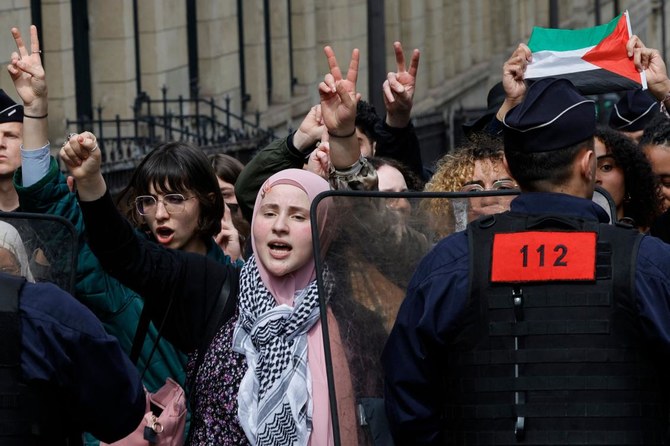
- About 50 protesters set up tents at midday Monday at the elite university’s courtyard
PARIS: French police removed dozens of students from the Sorbonne university after pro-Palestinian protesters occupied the main courtyard of the elite institution in Paris on Monday.
About 50 protesters set up tents at midday Monday at the Sorbonne university courtyard in support of Palestinians, echoing similar encampments and solidarity demonstrations across the United States.
Protesters unveiled a giant Palestinian flag and chanted slogans in support of Palestinians in Gaza, as Israel continues its offensive following the deadly Oct. 7 Hamas attack that triggered the Israeli-Hamas war. Police entered the university grounds in the early afternoon and removed them.
About 100 demonstrators took part in the protest near the prestigious university amid heavy police presence that were also guarding the university entrance to prevent students from setting up camp inside again.
Lorelia Frejo, a graduate student at the Sorbonne who joined a protest outside the university, said police used force to remove her peers from the courtyard. “They were peaceful and police took them out with no explanation,” Frejo said. Students in Paris were inspired by the protests at New York’s Columbia University who remain steadfast despite police pressure, she added.
“They (Columbia protesters) are very strong and want to fight for justice and for peace in Palestine,” Frejo said.
The Sorbonne occupies a unique place at the heart of French public and intellectual life. Last week, President Emmanuel Macron chose it as the venue to deliver a speech on his vision of Europe ahead of elections for the European Parliament in June.
Last week protests broke out at another elite university in the French capital region, the Paris Institute of Political Studies, known as Sciences Po, which counts Macron and Prime Minister Gabriel Attal among its many famous alumni.
Tensions had broken out on campus as pro-Palestinian students inspired by Gaza solidarity encampments at campuses in the United States sought to occupy an amphitheater.
On Friday, pro-Palestinian and pro-Israeli demonstrators faced each other in a tense standoff in the street outside the school. Riot police stepped in to separate the opposing groups.
The protest ended peacefully, when students agreed to evacuate the building late on Friday. The head of Sciences Po said an agreement with students had been reached.
Afghan Taliban’s treatment of women under scrutiny at UN rights meeting
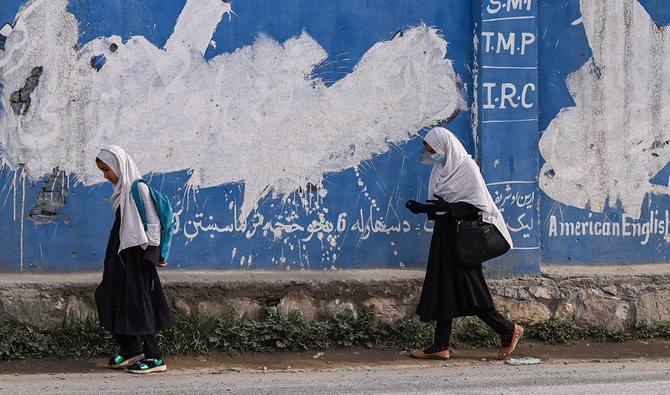
- The Taliban say they respect rights in line with their interpretation of Islamic law
- Taliban have barred girls from high school and women from universities and jobs
GENEVA: Afghanistan’s Taliban face criticism over their human rights record at a UN meeting on Monday, with Washington accusing them of systematically depriving women and girls of their human rights.
However, in an awkward first for the UN Human Rights Council, the concerned country’s current rulers will not be present because they are not recognized by the global body.
Afghanistan will instead be represented by an ambassador appointed by the previous US-backed government, which the Taliban ousted in 2021.
In a series of questions compiled in a UN document ahead of the review, the United States asked how authorities would hold perpetrators to account for abuses against civilians, “particularly women and girls who are being systematically deprived of their human rights“?
Britain and Belgium also raised questions about the Taliban’s treatment of women. In total, 76 countries have asked to take the floor at the meeting.
The Taliban say they respect rights in line with their interpretation of Islamic law.
Since they swept back into power, most girls have been barred from high school and women from universities. The Taliban have also stopped most Afghan female staff from working at aid agencies, closed beauty salons, barred women from parks and curtailed travel for women in the absence of a male guardian.
Under the US system, states’ human rights records are subject to peer review in public meetings of the Geneva-based Human Rights Council, resulting in a series of recommendations.
While non-binding, these can draw scrutiny of policies and add to pressure for reform.
The UN Human Rights Council, the only intergovernmental global body designed to protect human rights worldwide, can also mandate investigations whose evidence is sometimes used before national and international courts.
Indian students protest US envoy’s campus talk over Gaza war
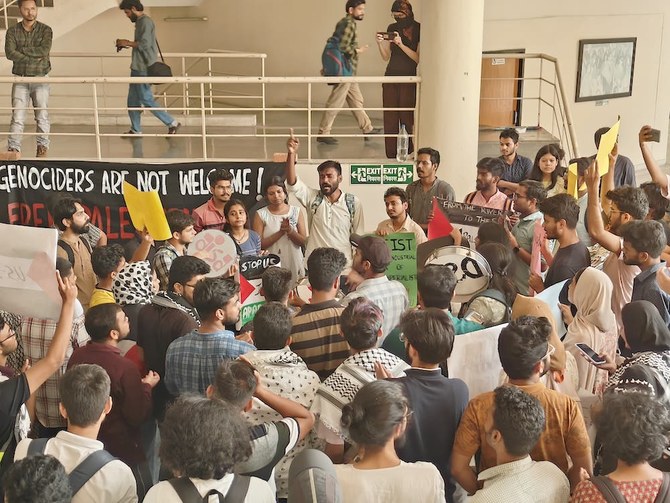
- Student-led protest led to university canceling an event involving US ambassador
- Indian students say they stand in solidarity with students protest across US
NEW DELHI: Students at one of India’s most prominent universities gathered in protest over an event involving the US ambassador to New Delhi on Monday, as they stood up against American support for Israel’s war on Gaza.
US Ambassador to India Eric Garcetti was invited for a talk on US-India ties at the Jawaharlal Nehru University in New Delhi on Monday afternoon, which would take place amid protests on American campuses demanding their universities cut financial ties with Israel over its military offensive in Gaza, which has killed more than 34,000 Palestinians.
At the university’s convention center, over 100 students organized by the Jawaharlal Nehru University Student Union protested the invitation of Garcetti, calling out his complicity “in the genocide Israel is currently doing in Palestine.”
JNUSU President Dhananjay told Arab News: “By calling such a person in the university … who is supporting the genocide, we want to tell them that JNU is not silent on this issue and we want to speak up.
“We are protesting against the US support for the genocide in Gaza committed by Israel.”
Hundreds of US college students have been arrested and suspended as peaceful demonstrations calling for a ceasefire in Gaza and divestment from companies linked to Israel spread across American campuses.
The student-led movement comes after nearly six months since Israel began its onslaught on the Gaza Strip, which Tel Aviv said was launched to stamp out the militant group Hamas.
Hundreds of thousands of housing units in the besieged territory have either been completely or partially destroyed, while the majority of public facilities, schools and hundreds of cultural landmarks have been demolished and continue to be targeted in intense bombing operations.
JNU student leaders said they stood in solidarity with the protesting students in the US.
“We are students, and we need to ask questions. If some atrocities are taking place and there are mindless killings going on, speaking out against this should be the responsibility of all sections of society,” Dhananjay said.
“The visuals that we see make us shiver and shake our conscience. If we don’t speak up, then I don’t think we have a right to be a social being.”
At the JNU campus on Monday, the student protest led to a cancellation of the event involving the US envoy.
“We feel happy that we forced the administration to cancel the talks by the ambassador,” JNUSU Vice President Avijit Ghosh told Arab News.
Despite India’s historic support for Palestine, the government has been mostly quiet in the wake of Israel’s deadly siege of Gaza.
When Indians went to the streets in the past months to protest and raise awareness on the atrocities unfolding in Gaza, their demonstrations were dispersed by police and campaigns stifled.
Members of Indian civil society have since come together to challenge their government’s links with Tel Aviv and break Delhi’s silence on Israel’s war crimes against Palestinians, reflecting similar concerns that some university students also felt.
“The US is supporting Israel in the killing of Palestinian people in Gaza. It’s also suppressing students in its country who are raising voice against the genocide in Gaza,” Ghosh said.
“We are agitated that India is being a mute spectator and not taking a clear stand against the ongoing genocide in Gaza.”


